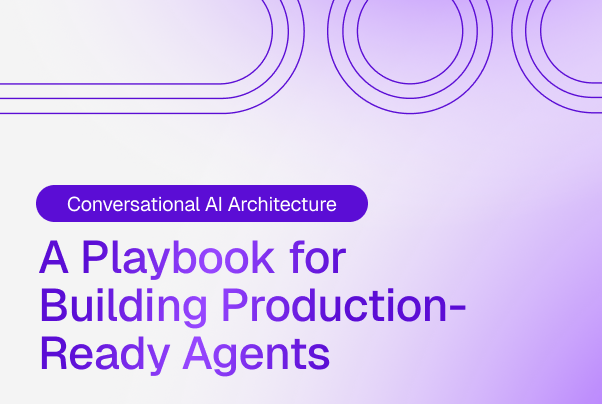Healthcare providers often spend hours on routine phone calls, from scheduling appointments to answering patient questions.
According to SpruceHealth, a typical healthcare provider handles 53 patient calls per day and spends 66 minutes of phone call overhead per day. And Medbelle, a leading healthcare provider across the UK, has shared that manual processes lead to patients waiting 1-2 days for an answer to simple queries.
With the rise of conversational AI technology, tools like AI voice bots are transforming these time-consuming processes, offering instant, scalable solutions for patient interaction.
In fact, a voice bot can do everything that consumers expect from their providers, like good customer support, proactive communication, and the ability to book appointments in advance.

In this blog, we'll explore the future of conversational AI for healthcare, its use cases, and key benefits.
Conversational AI in Healthcare: Shaping the Future of Care
While phrases like chatbot, virtual assistant, AI receptionist and conversational AI are interchangeably used, they are not made equal.
Unlike a chatbot that provides straightforward scripted answers, conversational AI combines machine learning, artificial intelligence, and natural language processing (NLPs) to comprehend and respond in human language. For instance, conversational AI chatbots in healthcare can schedule appointments, and even escalate urgent cases to doctors in real time.
The Conversational AI in Healthcare market was valued at USD 10.80 billion in 2023 and is projected to reach USD 80.50 billion by 2032, growing at a compound annual growth rate (CAGR) of 25.02% during the forecast period from 2024 to 2032.This rapid growth reflects the increasing demand for accessible, efficient care solutions, making conversational AI a must-consider technology for providers aiming to stay competitive
North America leads the Conversational AI in Healthcare market with a 34% share in 2023, driven by advancements in AI-powered chatbots that address rising healthcare costs and accessibility challenges. Asia-Pacific, with a 28% share, is the fastest-growing region, fueled by AI adoption, digital health investments, and innovations from countries like China, Japan, and India.

However, it’s not all rainbows as the rapidly growing AI industry also raises a few eyebrows. This is especially true in the ethics-intensive healthcare industry where many are concerned with how AI is using data. This is the reason why having an SOC2, HIPA, and GDPR-compliant Conversational AI partner is key to success.
How does a conversational AI/chatbot come into the picture?
Imagine parents of a newborn baby with no prior experience. They will hound doctors with their questions on the child's well-being. Multiply this with 10 new parents asking the same questions to one doctor every day, including the baby's temperature, vaccination, sleeping routine, etc.
These are relevant questions, but they do not need a doctor's response. An intelligent voice bot can guide these concerned parents by understanding and assessing the baby's symptoms and identifying the care it needs.
Additionally, it can also help with an appointment with the doctor at the right time based on the doctor's schedule and hours.
For instance, how a conversation with a voice bot can go:
Voice bot: Hi Sam! How can I assist you today?
I've: I've been feeling dizzy for the past hour.
VoiceWhat'sWhat's your current body temperature?
User: 39°.
VoiceThat'sThat's above normal. Are you experiencing any other symptoms?
User: I feel slightly feverish, too.
Voice bot: I recommend seeing your doctor, who is available today at 6 p.m. Would you like me to book an appointment?
User: Yes, please!
Voice bot: Your appointment is confirmed.
Over time, deep learning will enhance chatbots' ability to refine their responses with each interaction and generate context-specific replies using Natural Language Generation. With rapid data processing and sentiment analysis, chatbots will effectively escalate issues to physicians or initiate emergency assistance when necessary.
Use cases of conversational AI in healthcare
Consumers are eager for healthcare innovations that reduce barriers to care. With busy work schedules and home lives, taking time for wellness is challenging. Accordingly, a majority (52%) of people are now more interested in talking to a device than walk-ins or home visits. This reflects the shifting tides in the healthcare system, where convenience and accessibility are becoming paramount.
Here, are some of the fantastic use cases of conversational AI in healthcare:
Appointment scheduling
According to Notable, 88% of appointments are scheduled via telephone calls. Manual, error-prone processes leave slots open, which can cost healthcare providers $150B yearly.

Conversational AI can automate repetitive tasks of appointment management, unlocking a new era of efficiency. An intelligent conversation AI platform can help:
- Scheduling, rescheduling or cancelling appointments drastically reduces manual input and potential human errors.
- Offering an intuitive chat interface or voice assistant for seamless AI appointment booking.
- Minimizing wait times by automatically displaying available time slots during the booking process.
- Personalizing the experience by allowing patients to select their preferred dates, times, and doctors.
- Sending automated confirmation messages and reminders to ensure patients stay informed.
Case in point, after having their own conversational AI, Medbelle has seen a 60% increase in scheduling efficiency. Such advanced conversational AI systems enhance the organization of healthcare establishments and provide patients with a more seamless and responsive experience.
Patient care management
The fragmented nature of healthcare makes it difficult for consumers to obtain a complete view of their health information throughout the entire care journey. For instance, over half (52%) of consumers are uncertain about how to access a comprehensive health record.
Conversational AI offers a pivotal touchpoint between patients and healthcare professionals. It goes beyond enabling communication—it's about empowering individuals.
This technology allows patients to quickly request prescription refills, view test results, and access detailed information about their medications. By providing this information conveniently, conversational AI enhances patients' sense of autonomy and control, encouraging active participation in their healthcare journey through human interactions.
For instance, integrating conversational AI with electronic health records (EHR) allows patients to access lab results instantly, reducing the need for follow-up calls to clinics
Information Gathering & Document Retrieval
Healthcare providers are overwhelmed by the sheer volume of administrative tasks they must manage.
The demands are extensive, from documenting patient visits in Electronic Health Records (EHRs) to managing billing and coding. According to the American Academy of Family Physicians (AAFP), doctors dedicate approximately 50% of their work hours to administrative duties, spending up to 4.5 hours daily on EHR systems—both during and after work hours.
Conversational AI can engage in one-on-one interactions with patients, gathering all necessary information during the conversation. Through seamless integration with the organization's systems and processes, the AI can access existing records or generate new documentation to update patient files or create new cases.
This approach streamlines operations for your organization and ensures patients receive quicker responses and experience shorter wait times to have their needs addressed.
Proactive communication
Patients often seek quick answers to routine questions about medication, symptoms, or appointment scheduling. The conversational AI platform bridges that gap with 24/7 availability and prompt responses, alleviating the workload of healthcare staff and resources.
Moreover conversational AI also assists in prescribing appropriate treatment and medications based on the diagnosis. It ensures patients receive tailored healthcare recommendations, taking into account their health profiles and possible drug interactions.
Additionally, conversational AI can proactively send reminders for annual check-ups, vaccinations, or follow-up visits, ensuring patients stay on track with their health.
Invoice payment and claims
Inefficient processes across the revenue cycle collectively cost healthcare practices billions and billions of dollars. In the United States alone, the industry could have saved $16.3 billion every year in losses due to coding errors, under pricing, overlooked or unsubmitted charges, and inadequate or missing follow-up.
The conversational AI solutions streamlines this process by creating auto-invoices, forwarding invoices to the insurance department, and sending regular payment reminders.
For patients, these tools helps:
- Provide clear treatment cost estimates and billing details and address patients' follow-up questions to promote transparency.
- Streamline secure payment processes by offering multiple payment options and enabling installment plans.
- Assist patients with insurance-related queries, including claim statuses and reimbursement rates, while identifying errors in claim requests and accelerating their resolution.
For healthcare professionals, conversational AI manages preliminary questions, reducing their workload and optimizing the claim processing workflow.
Benefits of conversational AI in healthcare
A recent TechTarget survey of 2,700 patients found that about 40% of patients prefer digital health tools and voice bots over in-person visits due to their quick availability and ease of use.
Conversational AI, when introduced in the form of an AI Agent can immediately enhance your core customer contact processes, delivering a variety of benefits that elevate the experience for everyone involved, including patients and clinicians.
Some of its benefits include:
Reduces workload on existing physician workforce
According to the WHO, 10 million healthcare workers will be needed to meet global healthcare needs by 2030. Advanced technologies like conversational AI can make an enormous difference.
These tools are available 24/7, ensuring patients can seek medical advice anytime. They also reduce the burden on healthcare professionals and provide timely assistance even during off-hours.
Reduce overall costs and cost of care
Studies suggest that businesses can reduce customer service costs by up to 30% by implementing conversational solutions like virtual agents and chat bots.
Allowing human agents in contact centers to focus on complex inquiries enables them to dedicate more time to delivering high-quality service. This approach also decreases the number of agents needed on the call center floor. It lowers employee turnover caused by the repetitive nature of routine calls, resulting in substantial cost savings.
Enhance patient engagement
Patient engagement in healthcare acts as a communication medium between the provider and the patient. It enables patients to manage their health, medical expenses, appointments, and procedures, which helps to enhance better health outcomes.
Conversational agents streamline patient access to medical services by integrating symptom checkers and care location finders. This AI-driven solution improves access to medical information and reduces unnecessary doctor visits, ensuring a seamless and efficient patient experience.
Choosing the right conversational AI platform for healthcare
When selecting a conversational AI platform for health, it's, it's essential to consider both the specific needs of the healthcare operations and the features of the platform's guide to help make an informed choice:
Why choose Synthflow AI?
Synthflow's no-code, drag-and-drop interface allows users to set up a AI voice calling agent in minutes without needing any technical knowledge or coding ability. It can seamlessly handle a large volume of calls across all timelines and languages.
Features:
- Zero latency
- Text-to-speech and advanced transcription features
- 11labs integration – clone voices and automatically schedule appointments into your calendar
- Robust customer support
- Advanced call sorting, logging, and transferring
- Generate responses and action them live in call
- Resell Synthflow – fully white-labelled version available
CRM Integrations – Gohighlevel, Hubspot, Zapier, Make, Clickfunnels and Make
Synthflow offers advanced features and versatile use cases, making it ideal for healthcare businesses aiming to streamline patient management and automate appointment scheduling effortlessly.
Want to try a free demo to see how you can replace your traditional call centers with AI voice bots? Sign up here.






